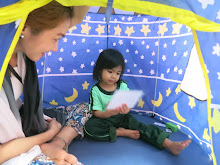
Building an inclusive environment that is caring and warm is imperative especially among children with additional needs. As an educator, I would like to emphasize two things that I would do to achieve this environment. One, in order for me to create that environment, I will build a supportive environment for all children. Secondly, I will build a supportive relationship with families.
Building supportive environment for all children is necessary because children need supportive relationships and interactions with those who are support providers and with their peers (Each Child Matters, 2014, p.61). It is essential for children with additional needs to have more opportunities to build relationships with adults and their peers. As educators, one of our roles is to understand and observe their strengths, needs and their style of learning in order to provide successful relationship-building opportunities (Each Child Matters, 2014, p.61). In doing this, we need to interact to with each child and navigate his/her strengths and challenges. Through our observation, documentation, gathering of information from his/her peers, and engagement with them help us understand the details of each child’s particular challenges and strengths. An example of doing this by interacting with them. We interact with the child through our circle time, when we have the opportunity to talk with the child and ask him/her questions like how was their sleep, what did they have for supper and others. Through simple interactions with them, we gather valuable information about their culture, interests, and the way they communicate with us. These pieces of information can be used to help us tailor their individual needs to support their learning, which is one of the most important roles we have as educators.
Another important thing in creating a caring and warm inclusive environment is building a supportive relationship with families. We know how vital knowing each child is under our care. It is also of great value that we take time to know their families in order for us to support them appropriately. Every adult in each child’s life is important for the child and they all play a role in all areas of development; emotional, physical, social and cognitive (Each Child Matters, 2014, p.63). An example of doing this is by communicating to parents, caregivers, and other adults we see who pick them up or send them to daycare. By talking to them, simple questions like how their day was, how’s the weather outside and other minor stuff make the families feel warm and welcomed. Through our constant communication with them, it provides us opportunities to observe them too, the way they talk and all those small details.
Forming a healthy relationship with parents provide advantages and benefits for all who are involved in guiding, caring, and teaching the child (Each Child Matters, 2014, p.63). These small chats create a gateway for us to know the family better. As a result, it will provide us a positive relationship with the children’s family under our care. From her book Parents to Partners: Building a Family-Centred Early Childhood Program, Jane Keyser, stresses the importance of and the benefits of the child seeing a positive, supportive, and nurturing relationships between the adults in their lives. It benefits two main categories in the child’s life; one, children’s emotional environment is conducive to learning and second is, children’s own social development is modeled on healthy relationships (Each Child Matters, 2014, p.63). Keyser describes that because young children are egocentric, they assume that whatever they see and hear is all about them. Therefore, when parents feel respected, nurtured and supported, children themselves feel respected, nurtured, and supported (Each Child Matters, 2014, p.63).
